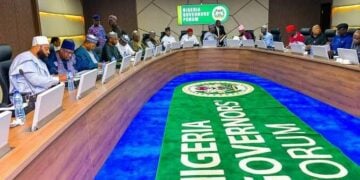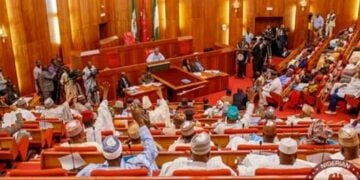The National Economic Council (NEC) has expressed satisfaction with the progress made in the fight against crude oil theft, following a significant increase in Nigeria’s daily oil production from about 700,000 barrels before May 2023 to over 1.7 million barrels daily.
Chairman of the NEC Ad-hoc Committee on Crude Oil Theft Prevention and Control, and Imo State Governor, Senator Hope Uzodinma, disclosed this while briefing State House correspondents after the Council’s 153rd meeting held on Thursday at the Presidential Villa, Abuja. The meeting was presided over by Vice President Kashim Shettima.
Governor Uzodinma said the Council received the interim report of his committee with satisfaction, acknowledging that the collaborative approach adopted by the committee had led to tangible progress in securing oil infrastructure and curbing theft across oil-producing regions.
“Before May 29, 2023, when President Bola Ahmed Tinubu assumed office, Nigeria’s crude oil production hovered around 700,000 to 800,000 barrels a day,” Uzodinma said. “But through collaboration with key stakeholders, regulators, and operators in the industry, our daily output now exceeds 1.7 million barrels per day.”
He attributed the progress to improved coordination among federal and state governments, security agencies, and industry operators.
“We involved all governors of crude oil-producing states, security agencies, including the Navy, the Nigerian National Petroleum Company Limited (NNPCL), and their consultants. Everyone was mobilised to secure our oil assets, and as a result, pipeline vandalisation and asset destruction have declined significantly,” he said.
The governor noted that NEC commended the committee’s performance and expanded its Terms of Reference to include oversight of Nigeria’s solid minerals sector, which has also suffered from illegal mining and revenue leakages.
“Our committee will now work with other government agencies to ensure that the country’s solid minerals — including gold and other valuable resources — are properly protected and that the revenues generated from them contribute meaningfully to the national treasury,” Uzodinma stated.
He explained that the move was part of a broader effort by the Federal Government to safeguard Nigeria’s natural wealth and eliminate theft across all sectors. “Our solid minerals are mined and stolen, not adding to national revenue. That must stop,” he said.
Uzodinma also revealed that the committee recommended stronger security measures around Nigeria’s oil-producing areas and maritime boundaries.
“We advised that NNPCL, working with security agencies and their consultants, should strengthen security in all the creeks in the Niger Delta and extend surveillance to the offshore regions to curb illegal entry and exit of vessels into our export terminals,” he added.
The governor expressed optimism that the reforms being implemented under President Tinubu’s administration would deliver lasting economic gains for Nigerians, particularly through improved oil and gas production and responsible resource management.
“It is a thing of joy that we have made real progress. The President promised Nigerians that prosperity is gradually becoming a reality,” Uzodinma said. “Our committee will continue to work hard because we have no other country to call our own. We are determined to ensure that our crude oil and gas resources are preserved and managed for the benefit of our people.”
The National Economic Council, chaired by the Vice President, comprises the 36 state governors, the Governor of the Central Bank of Nigeria, and key economic sector ministers.





